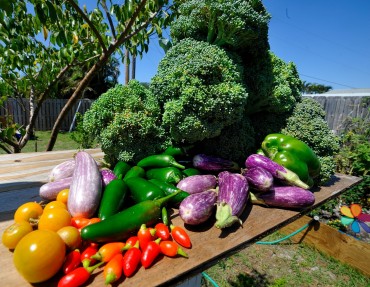Growing fresh vegetables in your garden is a great way of enjoying delicious home grown veggies. Well there can be hundred of reasons why you need to grow vegetables in your garden. The increasing price of vegetables in the grocery, added chemicals and pesticides, lack of a good variety, etc. can be some of the basic reasons why most people prefer growing fresh home grown vegetables for their daily use. No matter what you plan to grow, here are a few steps that will help you grow good and high quality vegetables within a few weeks.
• Step 1: Planning your garden
Before you start growing vegetables abruptly in your garden and end up with too many unwanted vegetables, it is better you divide it and grow vegetables based on your needs. Also, if you grow them without any proper planning you may find weeds growing around them. Thus, it is best to make a list of all the vegetables that you want to grow and best weed eater to cut down. Also decide if you want a small pathway around your garden.
• Step 2: Choosing area for your garden
Select the place for your garden. In order to make sure your vegetables grow perfectly, select a place that has a water source and has minimum 6 hours of sunlight throughout the day. Level the ground properly to make sure that your vegetables grow nicely. No matter where you decide to grow your vegetables, the only important factor is sunlight.
• Step 3: Soil Testing
Soil ph testing determines the productivity of your plants and the resulting bounty. The composition of minerals in the soil varies based on their location. Some have a high amount of minerals which may be good for growing a certain type of vegetables. Understanding the type of soil will only help you get better quality vegetables.
Check the nutrients available and its pH before you start growing vegetables. According to Randy Drinkard, testing the soil will tell you whether or not you need to add lime to your soil to maintain its pH level. Working at the Georgia’s Cobb County Extension, Drinkard also mentions that the soil test will help you select the suitable fertilizers for your garden. Testing the soil is not a yearly process, but should be done once in every 2 years to ensure the fertility of the soil.
Simply ask your county extension servicemen to take a sample of your garden’s soil and perform the analysis. The fee charged for the process is minimal.
• Step 4: Clean the current growth
Clean your entire garden before you start growing the vegetables in it. Spray a good quality wide-ranged herbicide on your land. This will kill all types of unwanted growth on the land. Then dig the soil with a spade and tilt the old surf up and then compost it.
• Step 5: Tilling the soil
For the first year, till the soil two times so as to ensure its quality. Hold the soil in your hands and check if it is dry enough to work on. In case you see water oozing out of your hands, then the soil is not dry enough and you will have to wait for some more time. Make a ball of soil and poke it. If the ball breaks down then the soil is ready.
During the first till, the soil becomes lost up to 1 foot (ideal for the roots to grow). During the second till, add all the nutrients and fertilizers that were recommended to you in the result of your soil test. The nutrients should be added nearly 3-4 inches within the soil. Compost is of great importance for your garden; especially as it helps keep your garden bed loose, holding the ideal amount of moisture content and minerals in it. So, if you do not have your own heap of compost, make sure you build one for your garden and its vegetables.
• Step 6: Sow your plants
Add a small amount of balanced fertilizer to your garden rows. Before spraying the fertilizer, read the instructions carefully on the packets. Also, read the details mentioned on the seed packets that you intend to plant. The cold season vegetables will not grow in the hot season of May and June, no matter how much care you take. Keep the plants at a proper distance from each other and keep them caged to prevent cows and other animals from eating them. Also, cut them properly if the length grows very fast.
Once you take good care of all these tips and follow them carefully, you will see your garden vegetable plants grow with great beauty. Do it carefully and you can reap its benefits for several years.

























































Comments